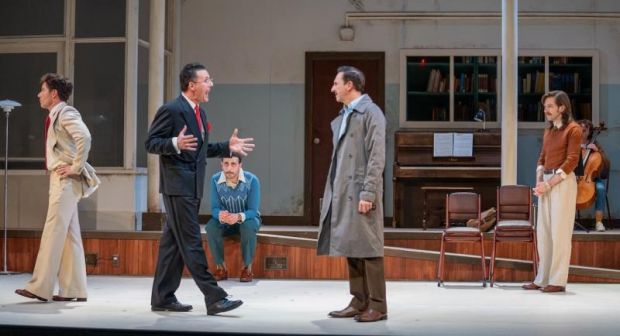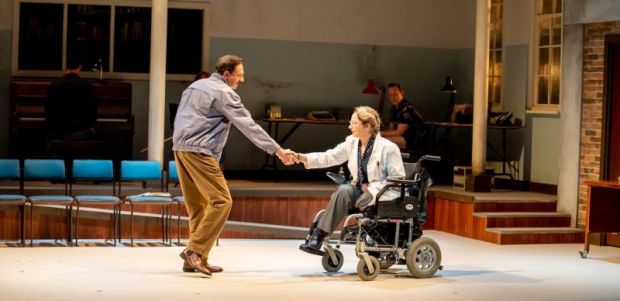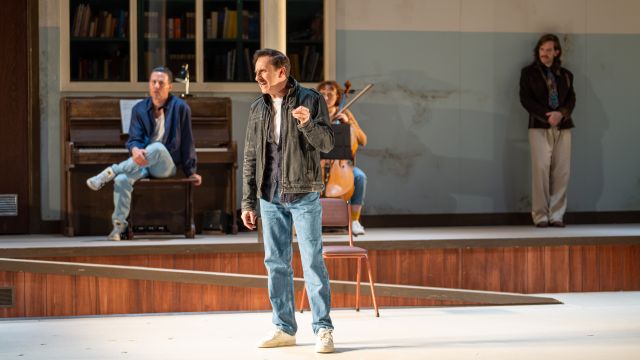Two Strong Hearts
Two very different theatre companies in Adelaide and Brisbane will mount productions this year of The Normal Heart – Larry Kramer’s powerful play set in 1980’s New York at Ground Zero of the AIDS crisis. Beth Keehn explores why the play still resonates today.
This year, as we celebrate the 50th anniversary of Gay Pride in the UK, and 44 years since Sydney’s first Mardi Gras, we must also remember that it is just over 40 years since the HIV/AIDS epidemic. Larry Kramer’s autobiographical play The Normal Heart explores how Kramer and his friends attempt to expose the truth about the mystery illness that is rapidly killing their friends and lovers. The play is receiving two local productions this year. The State Theatre Company South Australia will stage their production in Adelaide’s 600-seat Dunstan Playhouse, while indie co-op Ad Astra brings the action up close and personal in their small office-sized performance space in Brisbane. I spoke to actors Mitchell Butel (also Artistic Director at STCSA) and Gregory J Wilken (also Executive Producer at Ad Astra), who will both be playing Larry Kramer’s opinionated activist alter ego, Ned Weeks.
I started by asking why both companies were so keen to produce a play about a pandemic during a pandemic.
Mitchell: Our Director, Dean Bryant, and I have talked for years about producing The Normal Heart. With the impact of COVID, I thought there are so many resonances between the kind of fear that we’ve been through and the need for knowledge and information, and also the need for government support and advocacy when a pandemic starts. I thought in a way they’re such similar times, but also such different times. The worldwide response to COVID was incredibly different to the beginning of the AIDS crisis – because AIDS was seen by many to be a purely homosexual disease, and therefore not as important. Through the current pandemic, we’ve all desired information and certainty and leadership – those things were absent from the beginning of the AIDS crisis. I thought it would be interesting for modern audiences to celebrate the survival of all those incredible AIDS activists and also to question whether there would be a different response if the AIDS crisis was just beginning now: one would hope so.

Gregory: I’ve wanted to do The Normal Heart for many years, having lived through the worst of AIDS in Australia. I lost my best friend around my 30th birthday. I remember sitting in a pub in Sydney with my friends after we’d been to four funerals in one day. Another friend walked in and told us that Dave had just died. And that was how we lived. There’s a line in the play: ‘I’m trying to understand why nobody wants to hear we’re dying, why nobody wants to help.’’ I thought now is the perfect time to see this play – because people didn’t understand at the time, but now when they see what happened, people might question what they think about that situation. Also, we need to talk about our history. Sadly Larry Kramer passed away last year – many of his friends who feature in The Normal Heart have died, and four of the original cast members from the first production in New York in 1985 died from AIDS-related complications.
Mitchell: I think that good plays like this one, that are so culturally and contemporarily specific, gain even more weight as pieces of theatre the longer they remain part of the canon. Think of Arthur Miller’s The Crucible, a play that was very powerful in its time, written for a particular reason (to highlight McCarthyism). For The Normal Heart, the issues of fear and homophobia, activism and advocacy remain, and you realise that the thread of humanity goes through all these periods. But also, it’s very important to see what happens in history and how we can ensure that similar things don’t happen again. What can we do to ensure that these kinds of voices will be listened to in a way that they weren’t before? Also, another big part of this play is celebrating the value of our medical staff. That’s done through the character of Dr Emma Brookner – who immortalises the real-life Dr Linda Laubenstein, one of the first medical researchers and practitioners to sound a warning about the AIDS epidemic.

When I asked Mitchell and Gregory what attracted them to the character of Ned Weeks, intriguingly, both actors cited the same speech as a crucial moment.
Gregory: In many ways I am Ned Weeks – everything he stands for is me! The majority of gay people are like me – they just live a normal life. But also, the line that got me was, “I belong to a culture that includes Proust, Henry James ... Cole Porter, Plato, Socrates ... Michelangelo, Leonardo da Vinci ... James Baldwin... these are not invisible men.” Why can’t we celebrate that?
Mitchell: The dialogue is very witty, very intelligent, and crackingly passionate. I know it’s going to be a joy and a thrill to perform. There’s one particular speech I love where Ned is talking to his friend Bruce – Bruce is closeted, Ned is not – and he talks about belonging to a culture that includes so many great thinkers and artists like Proust and Henry James, Leonardo Da Vinci and more, including Alan Turing, who cracked the Enigma code during World War Two – and the notion that, until we are proud to name who we are to the world, until we can accept ourselves for our own value, then it’s hard to promote that value to other people.

I wondered if younger audiences will have a better understanding of the AIDS crisis in the 1980s, having lived through our current pandemic.
Mitchell: I really hope so. I was in my teens when information about the AIDS crisis was filtering through. I was at Uni, and in 1990 a couple of my friends passed away, and you’d see the impact of people who were HIV positive. As a teenager, with all the Grim Reaper fear-based TV advertising, the fear of coming out was amplified.
Gregory: During the AIDS pandemic, we still lived and loved and partied, but we had this deep fear all the time. I think young people will relate to that today. Also, people are still having trouble coming out. Why in 2022 are we still seeing so much heartache?
In the play, the media has a vital role in raising awareness of the disease. Has that changed?
Gregory: Ned is very outspoken in the play about the fact that he considers Mayor Koch and The New York Times to be responsible for the death of millions of gay men because they wouldn’t talk about it. There’s a line in the first scene: “The Times won’t even use the word ‘gay’ unless it’s in a direct quote.” But today I think it’s worse because I just don’t think anyone trusts the media right now. And with right-wing groups and use of social media, we don’t listen any more to understand; we talk to get our point across. It’s so important that we change that.
Mitchell: There were very powerful forces at work in the early days of the AIDS crisis; information was being suppressed and voices were being shut down. I think the press has done a much better job on COVID than they did in the early days of AIDS. I think there’s been a real desire to educate people with as much information as possible about COVID, so much so that we are all probably exhausted by it. Ned has another line that resonates with our current situation: “Nobody listens for very long anyway. There’s a new disease of the month every day.”

I wanted to find out about the casting process. All of the characters in The Normal Heart are gay, except Ned’s brother, Ben, and Dr Emma Brookner, a polio survivor who uses a wheelchair. Was it important to cast performers with lived experience?
Gregory: Our co-directors Michelle Carey and Anna Loren had a clear picture of these characters and who Larry Kramer based them on, and some of our actors are so similar it has blown us away. While it’s important that we allow gay people to perform gay roles, we have not asked our actors if they are gay or straight. For Dr Emma Brookner, we found the fabulous Maddie Little (who will be sharing the role with Janelle Bailey). Maddie works with Indelability Arts and Access Arts as an actor with a disability. Ad Astra is serious about diversity and I’m so grateful to Maddie for agreeing to come on board. We are also very excited to announce that the role of Felix will be played by Hugh Sheridan. Hugh’s generosity of spirit is so unbelievable – he called me and said that he’d heard we were doing The Normal Heart and he wanted to be in the play! Our wonderful cast also includes Felix Jarvis, who will take over from Hugh for two performances, Sam Hocking, Mathew Costin, Rad Valance, Mark Edwards, Connor Clarke, Troy Bullock and Liam Wallis.
Mitchell: Our Director, Dean Bryant, was very keen to see a wide group of people. Our cast includes Michael Griffiths, Matt Hyde, Anthony Nicola, Evan Lever, Ainsley Melham, AJ Pate, and Mark Saturno. We didn’t design it to be this way, but what’s ended up happening is that all the gay characters in the show will be played by gay actors. I don’t think that you have to cast that way, but I think at this point in our cultural history, it’s interesting that all the people who connected most with the material happened to be gay actors themselves. Plus the actress playing Dr Emma Brookner is the wonderful Emma Jones, who herself has a lived experience of disability. We have all different history and associations, but I think there’ll be a lot of great mileage to be gained from people’s own very special connections to this material. I think it will be interesting to see what audiences think, having lived through COVID. I think the play will be a draw for audiences and will really keep them talking in the car on the way home and the next day at work.
Read the Stage Whispers Review of the Adelaide season here.
You can find out more on the company websites:
State Theatre Company SA (30 September to 15 October 2022):
https://statetheatrecompany.com.au/shows/the-normal-heart/
Ad Astra Brisbane (3 to 27 November, plus a special performance for World AIDS Day on 1 December):
https://www.adastracreativity.com/productions/the-normal-heart
Production images from the State Theatre Company SA production by Matt Byrne.
Subscribe to our E-Newsletter, buy our latest print edition or find a Performing Arts book at Book Nook.

